
by Bag It Team | Oct 8, 2025 | Educational Articles
By Ben Katsel, Associate Wealth Advisor at Mariner
A serious medical diagnosis can change life quickly—not just emotionally and physically but financially too. Amid new appointments, treatment plans and shifting priorities, it’s easy to push financial decisions aside. Yet creating a plan for times of change may help provide stability, clarity and peace of mind.
It’s helpful to understand the difference between financial advice and financial planning. Advice often focuses on answering specific questions, such as how to invest or where to save. Financial planning is broader: it’s an ongoing process of aligning your financial resources with your goals, values and needs. It considers your entire financial picture and is designed to help you make confident decisions, even when life feels uncertain.
Here are three foundational steps to help you begin:
Understand Your Current Financial Picture
Start by organizing what you have and what you owe. Review your income and expenses, including any new medical costs or changes to work. Identify your savings and emergency funds, ideally enough to cover several months of essential expenses, and list any debts and their terms. Finally, understand your insurance coverages—health, disability, and life—and how they might support you now.
This snapshot becomes the foundation for any future planning. It shows where you stand today and where adjustments may be needed.
Prioritize Flexibility Over Perfection
In uncertain times, financial plans should adapt. That might mean revisiting your budget to address new expenses or using tools like Health Savings Accounts (HSAs) or Flexible Spending Accounts (FSAs) for medical costs. Explore benefits such as short-term disability or Family and Medical Leave (FMLA) if income is affected.
The goal is progress, not perfection. A flexible plan that evolves with your situation is far more valuable than one that tries to predict everything in advance.
Balance Today’s Needs with Tomorrow’s Goals
Immediate concerns deserve focus, but small steps toward the future matter too. Consider reviewing beneficiary designations, updating estate documents and continuing to save for the long term, even if contributions are smaller for now. These actions are meant to help protect your future choices and keep your plan aligned with your goals.
Final Thought
Financial planning is a process designed to help create stability and confidence; it is not just about managing money. By taking small, intentional steps now, you can focus on building a plan that supports you and your loved ones through whatever comes next.
For additional guidance, the CFP Board’s overview of the financial planning process provides an excellent starting point. FINRA also provides helpful strategies for preparing for and navigating financial hardship, and the National Cancer Institute outlines track and manage cancer-related costs.
This article is for informational and educational purposes only and should not be construed as personalized advice. Financial planning cannot eliminate risk or uncertainty, and outcomes may vary based on individual circumstances. For additional information visit mariner.com.
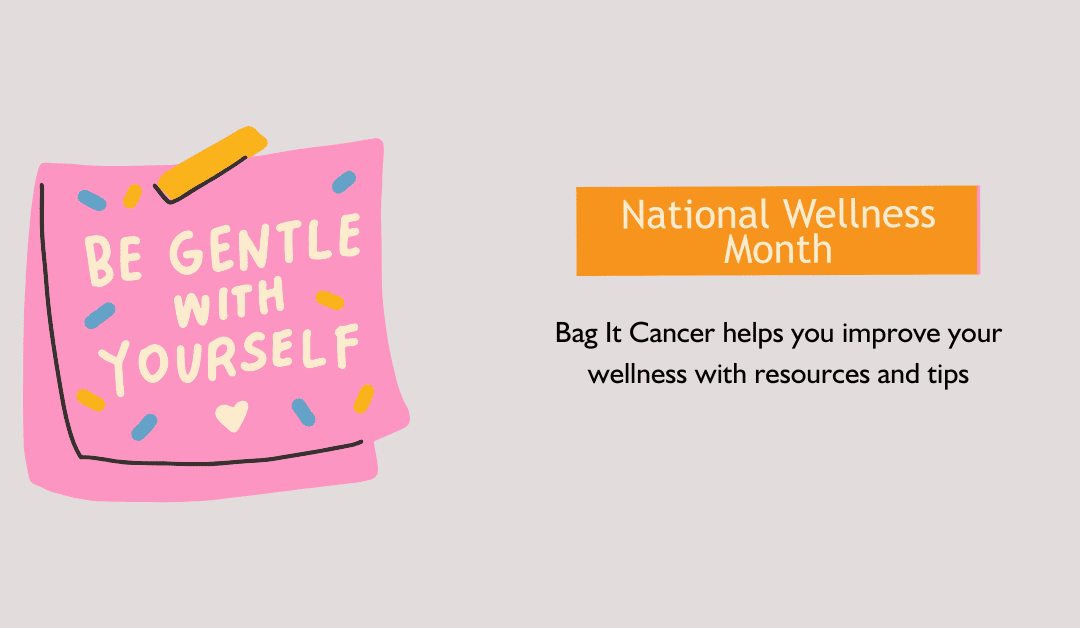
by Bag It Team | Aug 5, 2025 | Educational Articles
August is National Wellness Month—Explore how Bag It Cancer helps nurture physical, emotional, and informational well-being on your cancer journey.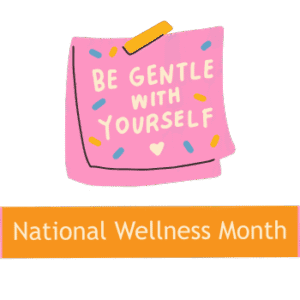
Navigating a cancer diagnosis or supporting a loved one through theirs can bring a whirlwind of emotions, decisions, and challenges. That’s why National Wellness Month is such an important time to pause, reflect, and reconnect with the things that support your overall well-being—not just physically, but emotionally and mentally too.
At Bag It Cancer, we believe that wellness isn’t one-size-fits-all. It’s not about perfection or pressure—it’s about feeling empowered, informed, and supported, no matter where you are in your journey. Whether you’re newly diagnosed, a long-time survivor, or a caregiver walking alongside someone you love, small steps toward wellness can make a meaningful difference.
Empowering Through Information
One of the most powerful ways we support wellness is by putting trusted, understandable information directly into your hands. The Bag It resource bag includes tools to help you stay organized, learn more about your diagnosis, keep track of important documents, and feel more in control of what’s ahead. When people understand their options and feel confident asking questions, they often feel less overwhelmed and more engaged in their own care.
Emotional Wellness Matters
We also know that wellness includes how you’re feeling—mentally and emotionally. That’s why our materials include space to journal your thoughts, track how you’re doing day-to-day, and write down questions or reflections. These small actions can bring clarity and comfort during times of uncertainty. You don’t have to have all the answers—you just need space to process and tools that support your journey.
Caregiver Support Is Wellness, Too
If you’re a caregiver, your wellness matters just as much. It’s easy to focus all your energy on your loved one, but taking moments to care for yourself helps you stay grounded and connected. Bag It includes resources designed just for caregivers, offering guidance, encouragement, and ways to feel supported in your role.
4 Simple Ways to Focus on Wellness This Month
1.Step outside and enjoy a moment of fresh air
2.Journal three things you’re grateful for
3.Take a few deep breaths with intention
4.Revisit your Bag It materials for insight and clarity
Wellness Resources
Cancer wellness resources encompass a wide range of support and information for individuals and their families affected by cancer. These are just a few of the available resources offering emotional support, financial assistance, information about treatment options, and access to support groups and more.
American Cancer Society Wellness Resources
National Institutes of Health Emotional Toolkit
Explore the Bag It Cancer Resource Center for additional trusted, accessible support.
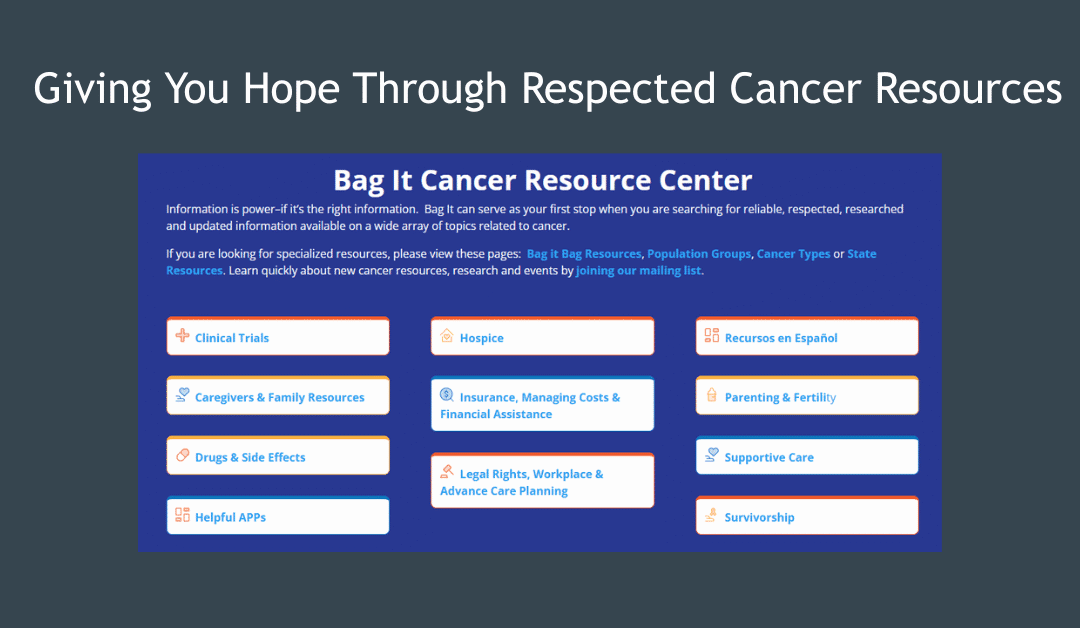
by Bag It Team | Jul 7, 2025 | Educational Articles
Explore the Bag It Cancer Resource Page
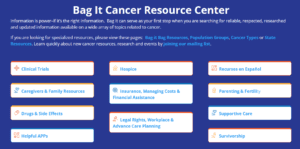 Navigating a cancer diagnosis—whether it’s your own or a loved one’s—can feel overwhelming. That’s why Bag It Cancer is committed to making the journey a little easier with trustworthy, accessible resources all in one place.
Navigating a cancer diagnosis—whether it’s your own or a loved one’s—can feel overwhelming. That’s why Bag It Cancer is committed to making the journey a little easier with trustworthy, accessible resources all in one place.
The Bag It Cancer Resource Center is thoughtfully curated to support patients, caregivers, and healthcare providers at every stage. Whether you’re looking for guidance on supportive care, emotional support, survivorship, caregiver tools, or community connections, you’ll find credible organizations and up-to-date information right at your fingertips.
This free, easy-to-navigate hub includes links to national resources across a range of topics—financial help, clinical trials, mental health, and more. It’s an extension of the support offered through our Bag It Bags, helping you stay informed and empowered beyond the doctor’s office.
We encourage you to visit our Resource Center and share it with anyone who may benefit. At Bag It, we believe that information is power—and hope.

by Bag It Team | May 30, 2025 | Educational Articles
June marks Men’s Health Month, a time to raise awareness about preventable health problems and encourage early detection and treatment of disease among men and boys. At Bag It, we recognize how important it is to empower men with the tools and information they need—especially when facing a cancer diagnosis.
Cancer & Men: Know the Risks
 Men are more likely than women to be diagnosed with cancer and have a higher mortality rate. The most common cancers affecting men in the U.S. are:
Men are more likely than women to be diagnosed with cancer and have a higher mortality rate. The most common cancers affecting men in the U.S. are:
- Prostate cancer
- Lung cancer
- Colorectal cancer
- Bladder cancer
- Melanoma
Early detection is key. Men often delay routine checkups or ignore early symptoms. Regular screenings can catch issues before they become serious.
Tips for Taking Charge of Your Health
- Schedule annual checkups – Even if you feel fine, regular visits can help detect problems early.
- Know your family history – Some cancers run in families; talk with your doctor about any history of cancer.
- Get screened – Discuss appropriate cancer screenings with your provider (especially for prostate, colorectal, and skin cancer).
- Live healthy – Eat well, stay active, limit alcohol, don’t smoke, and protect your skin from the sun.
- Talk about it – Encourage the men in your life to prioritize their health, too.
How Bag It Cancer Can Help
If you or someone you know has been diagnosed with cancer, our Bag It Bag provides reliable, easy-to-understand materials to help patients feel informed, empowered, and organized. Men may not always ask for help—but they deserve support, too.
Let’s break the silence around men’s health and encourage the men in our lives to take action today.
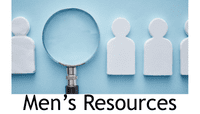
Resources
General Men’s Health & Preventive Care
- Men’s Health Guidelines for Screening
- Men’s Health Month (Men’s Health Network) – Information, health facts, and advocacy resources dedicated to men’s health.
- CDC – Men’s Health – Covers key health risks, preventive steps, and tips for staying healthy.
Support for Men Facing Cancer
- Bag It – Get a Bag – Free resources to help patients feel informed, empowered, and organized.
- ZERO – The End of Prostate Cancer – Support, education, and advocacy specifically for those impacted by prostate cancer.
- COLONTOWN – A patient-led community for colorectal cancer
- GO2 for Lung Cancer – Education, screening & support for lung cancer
- CancerCare – Support for Men – Support groups, counseling, and educational workshops for men affected by cancer.
- Cancer Support Community – For Men – Emotional and practical support specifically geared toward men
Bag It Bags for Specific Cancers
- Prostate Cancer – Bag It and ZERO Prostate Cancer have partnered to develop 2 Bags of essential resources for patients and caregivers impacted by Advanced-Stage and Early-Stage Prostate Cancers.
- Colorectal Cancer –Bag It and Colontown have partnered to develop this Bag of essential resources for patients and caregivers impacted by colorectal cancer (CRC).
- Lung Cancer – Bag It and GO2 for Lung Cancer have partnered to develop this Bag of essential resources for patients and caregivers impacted by Lung Cancer.
Explore other Bag It Cancer-specific Bags.
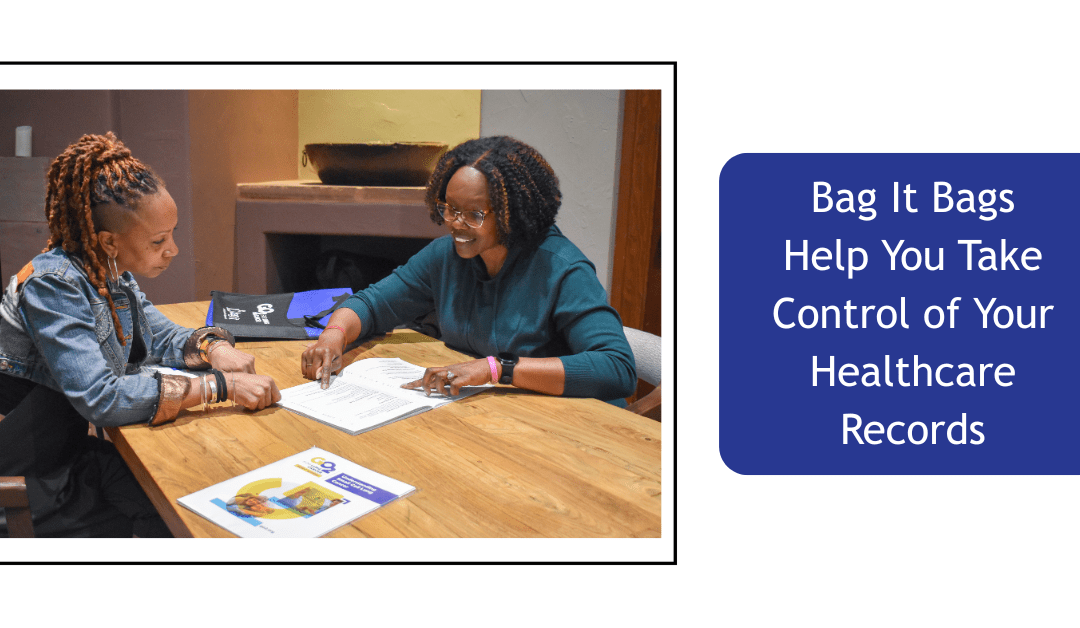
by Bag It Team | Apr 7, 2025 | Educational Articles
Why It Matters & How Bag It Can Help
 March is Records Management Month—a perfect time to assess how you organize and manage your healthcare records. Whether you’re navigating a new diagnosis, managing a chronic condition, or simply keeping up with routine checkups, having your medical records organized can save time, reduce stress, and empower you to be an active participant in your care.
March is Records Management Month—a perfect time to assess how you organize and manage your healthcare records. Whether you’re navigating a new diagnosis, managing a chronic condition, or simply keeping up with routine checkups, having your medical records organized can save time, reduce stress, and empower you to be an active participant in your care.
Why Keep Your Healthcare Records Organized?
Medical records contain essential details about your health history, including test results, treatment plans, medications, and doctor’s notes. Keeping track of these documents helps you:
- Ensure accurate and consistent care – Having records readily available helps healthcare providers make informed decisions.
- Prevent duplicate tests and procedures – Access to past test results can save time, reduce costs, and avoid unnecessary procedures.
- Monitor progress and advocate for yourself – Tracking treatment plans, medications, and symptoms allows for better communication with your medical team.
- Prepare for emergencies – Quick access to records can be crucial in urgent situations, especially when visiting new doctors or specialists.
How a Bag It Bag Can Help
 At Bag It Cancer, we understand that managing medical information can be overwhelming. That’s why every Bag It bag includes a My Companion Guidebook, a simple and effective tool designed to help patients and caregivers organize their healthcare journey. Inside, you’ll find:
At Bag It Cancer, we understand that managing medical information can be overwhelming. That’s why every Bag It bag includes a My Companion Guidebook, a simple and effective tool designed to help patients and caregivers organize their healthcare journey. Inside, you’ll find:
✔ Tabbed sections to sort medical records, test results, and insurance information.
✔ Prompted pages for recording doctor visits, questions, and treatment details.
✔ Resources to help you understand your diagnosis, treatment options, and survivorship care.
Whether you’re dealing with cancer or another serious health condition, staying organized gives you confidence and control. This Records Management Month, take the time to gather, review, and organize your healthcare records. And if you or someone you know could benefit from a Bag It bag, visit [Bag It Cancer’s website] to learn more.
For more tips, read this story from our April 2022 Newsletter.
Be Empowered. Be Engaged. Bag It!






 Navigating a cancer diagnosis—whether it’s your own or a loved one’s—can feel overwhelming. That’s why Bag It Cancer is committed to making the journey a little easier with trustworthy, accessible resources all in one place.
Navigating a cancer diagnosis—whether it’s your own or a loved one’s—can feel overwhelming. That’s why Bag It Cancer is committed to making the journey a little easier with trustworthy, accessible resources all in one place.
 Men are more likely than women to be diagnosed with cancer and have a higher mortality rate. The most common cancers affecting men in the U.S. are:
Men are more likely than women to be diagnosed with cancer and have a higher mortality rate. The most common cancers affecting men in the U.S. are:

 March is Records Management Month—a perfect time to assess how you organize and manage your healthcare records. Whether you’re navigating a new diagnosis, managing a chronic condition, or simply keeping up with routine checkups, having your medical records organized can save time, reduce stress, and empower you to be an active participant in your care.
March is Records Management Month—a perfect time to assess how you organize and manage your healthcare records. Whether you’re navigating a new diagnosis, managing a chronic condition, or simply keeping up with routine checkups, having your medical records organized can save time, reduce stress, and empower you to be an active participant in your care. At Bag It Cancer, we understand that managing medical information can be overwhelming. That’s why every Bag It bag includes a My Companion Guidebook, a simple and effective tool designed to help patients and caregivers organize their healthcare journey. Inside, you’ll find:
At Bag It Cancer, we understand that managing medical information can be overwhelming. That’s why every Bag It bag includes a My Companion Guidebook, a simple and effective tool designed to help patients and caregivers organize their healthcare journey. Inside, you’ll find:
Recent Comments